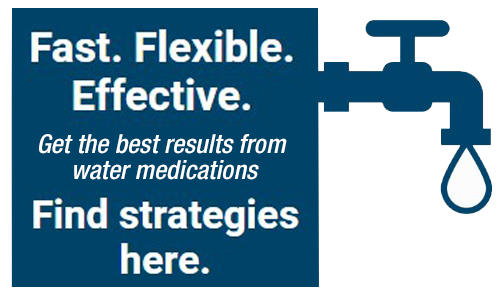When treating pigs, focus on water quality, mixing protocols and water system cleanliness.
WILMINGTON, N.C. [Nov. 9, 2020] – Water-soluble medications are a fast, flexible option for treating pigs. They can be mixed in the barn and delivered immediately. They typically have a shorter duration of treatment than feed medications. However, water-soluble medications require careful management of a key ingredient – your water – for effective treatment.
“Water-soluble medications sometimes get blamed when producers have difficulty getting the medication to dissolve, have problems with reduced water flow or have to treat pigs multiple times for effective treatment,” says Chad Smith, DVM, swine technical specialist, Pharmgate Animal Health. “But often, these issues are solved by paying close attention to a key ingredient: water.”
When water quality is good and water systems are clean, medications dissolve well and provide an effective, economical treatment regimen.
Maximize your water-soluble medication’s effectiveness by paying attention to these three areas:
- Water quality
“Clean, quality water supports increased water intake and helps ensure pigs – especially sick pigs – receive the intended treatment dosage,” says Smith. “Sick pigs will initially continue to drink even when they lose appetite, and quality water ensures infected pigs receive the intended dosage when it’s needed most.”
Testing water is the best way to ensure clean, quality water. Pull samples directly from the well and the drinkers to help determine if a potential problem comes from the water source or the water equipment.
One test result to watch closely is pH, which impacts palatability and water intake. The ideal pH for swine water systems is between 6.5 and 6.8, which is slightly acidic. Improved palatability or taste encourages water intake for proper dosing as well as improved feed conversion, feed consumption and nutrient absorption.
- Mixing protocols
“Correct mixing protocols ensure medications are dissolved well for accurate dosing,” says Smith. “Accurate dosing saves producers money and is a responsible use of antibiotics because it minimizes excess use.”
When evaluating your mixing protocols, ensure the person mixing water-soluble medications uses the right amount of water and stirs for the time indicated on the product label.
“Most of us want to work quickly, so we might get frustrated if a water-soluble medication doesn’t dissolve instantly,” says Smith. “Some products take longer to dissolve, but that doesn’t mean they aren’t effective. Correct mixing time can help ensure the product is dissolved completely for proper dosing.”
A properly mixed solution will always appear clear and will not plug waterers and nipples.
- Water system cleanliness
“If water lines contain bacteria, the antibiotic reacts with the bacteria and is not delivered to the pig,” says Smith. “Cleaning and maintaining water lines is easier and more cost-effective than losing pigs from ineffective medication delivery.”
Implement a consistent and thorough water system cleaning and maintenance plan to help eliminate build-up from minerals or biosolids (bacteria or fungi). For best results, ensure lines are clean and flushed before and after administering water-soluble medications. Cleaning systems between groups or turns of pigs is a good way to ensure lines are clean. Trigger any valves and flush with cleaner-treated water to keep bacteria and mineral build-up to a minimum.
Even a small amount of build-up can have a big negative impact. Mineral or biofilm build-up of only one-eighth of an inch inside water lines can reduce water volume per minute to pigs by as much as 30%. Losing that much space inside your lines can reduce delivery of medications to your sick herd.
“Water systems need to be fully functional with quality water flowing through them to deliver water medications correctly,” says Smith. “Veterinarians prescribing water-soluble medications do so assuming pigs can drink as much water as they like. You can help ensure that happens by providing quality water, mixing medications correctly and delivering medications through a clean water system.”
Get more tips to maximize your water-soluble medication strategy at pharmgate.com/usa/water-medications/.
Founded in 2008, Pharmgate Animal Health is headquartered in Wilmington, North Carolina, and provides innovative and high-quality products that help the livestock industry optimize animal health, efficiency and production. The company’s pharmaceutical production facilities are in Omaha, Nebraska with vaccine research and manufacturing operations based in St. Paul, Minnesota. To learn more about Pharmgate Animal Health, visit pharmgate.com.

Chad Smith, DVM

 Select A Location
Select A Location
